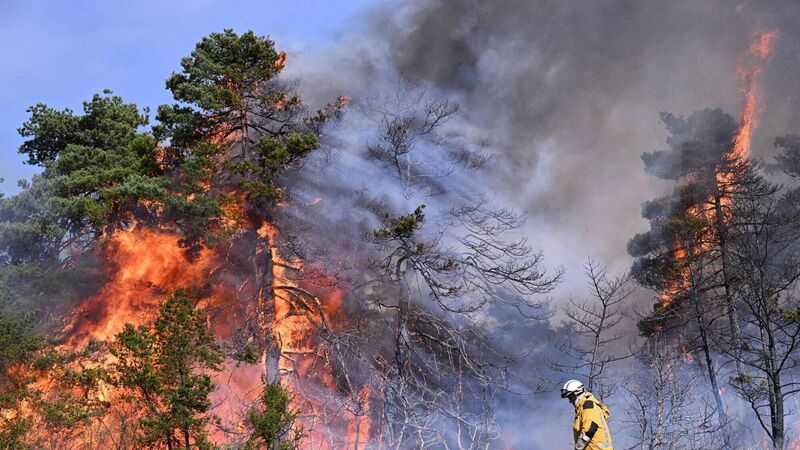Wildfires to become more commonplace even if global warming is curbed

A wildfire in southern France in August. World Meteorological Organisation secretary-general Professor Petteri Taalas said: "We have seen this in the heatwaves in Europe and China this year when stable high atmospheric conditions, sunlight and low wind speeds were conducive to high pollution levels." (Photo: Pascal Guyot / AFP
Wildfires such as the devastating Australian disaster of 2019 will become much more commonplace, with declining air quality - even if emissions and global warming are curbed.
The World Meteorological Organisation (WMO) warned that the wildfires brought on by extreme heatwaves in Europe this year are a "foretaste of the future", with the a so-called "climate penalty" - worsening air quality - to pay.
In its annual Air Quality and Climate Bulletin, the WMO examined scenarios under the lower emissions targets to limit global warming, as well as forecasting the impacts if emissions were to stay high.
WMO secretary-general Professor Petteri Taalas said: "As the globe warms, wildfires and associated air pollution are expected to increase, even under a low emissions scenario. In addition to human health impacts, this will also affect ecosystems as air pollutants settle from the atmosphere to earth’s surface.
"We have seen this in the heatwaves in Europe and China this year when stable high atmospheric conditions, sunlight and low wind speeds were conducive to high pollution levels. This is a foretaste of the future because we expect a further increase in the frequency, intensity and duration of heatwaves, which could lead to even worse air quality, a phenomenon known as the climate penalty."
This week, data from the the EU's Copernicus Atmosphere Monitoring Service (Cams) separately shows August's heatwave, combined with prolonged dry conditions, led to wildfires that emitted the highest levels of greenhouse gas for 15 years.
Asia will bear the major brunt of the climate penalty, the WMO said. Climate change could exacerbate surface ozone pollution episodes, leading to detrimental health impacts for hundreds of millions of people, it added.
The WMO's bulletin said that wildfire smoke produced widespread increases in particulate small matter (PM2.5) levels, especially in North America and Siberia. Particulate matter is all solid and liquid particles suspended in air, such as dust, pollen, soot, smoke, and liquid droplets.
New WMO Air Quality and Climate Bulletin:#Climatechange ➡️more frequent, intense and longer heatwaves and risk of poorer air quality because of ground-level ozone pollution.
— World Meteorological Organization (@WMO) September 7, 2022
This so-called “climate penalty” could impact many millions#WorldCleanAirDay
⤵️https://t.co/toYtCl29j8 pic.twitter.com/9SFMHKEreZ
In Ireland, around 1,400 deaths each year are attributed to poor air quality, driven by PM2.5 and other pollutants.
The WMO pointed to the UN-backed Intergovernmental Panel on Climate Change (IPCC) report which said that wildfires such as the Australian catastrophe of 2019 and the western US disasters in 2020 and 2021 are likely to increase by 40% to 60% by the end of this century under a high emission scenario, and by 30% to 50% under a low emission scenario.
CLIMATE & SUSTAINABILITY HUB





